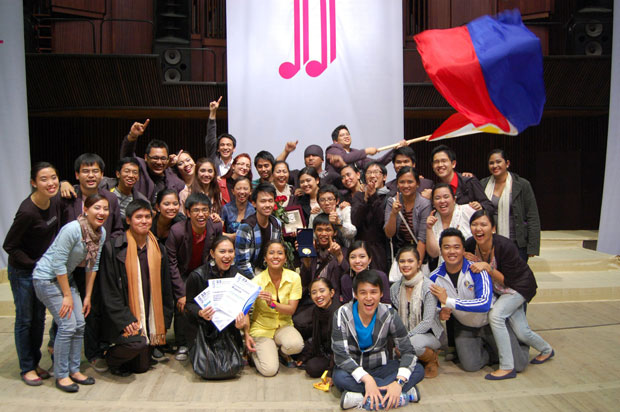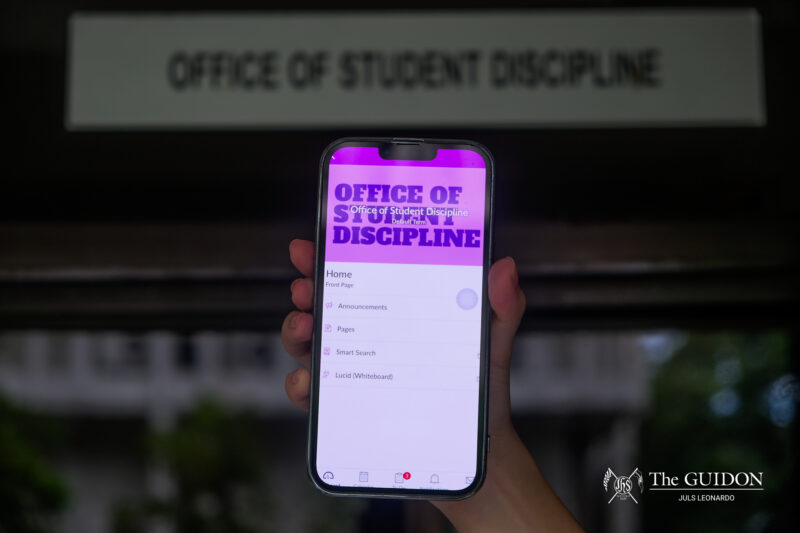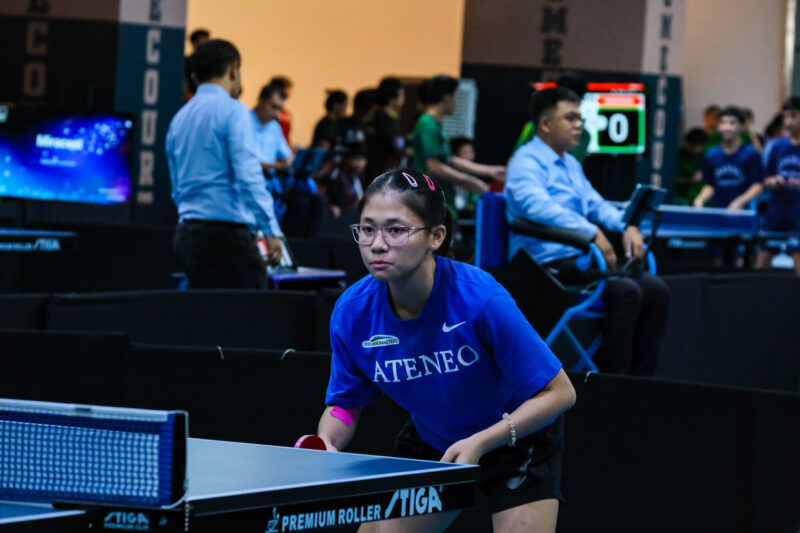
World class champions. The Ateneo College Glee Club, all smiles and looking forward to next year’s European Grand Prix (EGP). Photo courtesy of Miggi Angangco
Work and play may seem like polar opposites, but when you’re in an award-winning choir that competes in international competitions, combining those two might not be such an impossible feat.
This was exactly what the multi-awarded Ateneo College Glee Club (ACGC) did last summer, when the choir embarked on an 81-day European competition and concert tour from April 1 to June 20.
Aside from performing for foreigners and Filipinos abroad, the choir joined five competitions, garnering awards in all of them.
But the most important win was bagging the top prize in the 33rd Varna International May Choir Competition held in Varna, Bulgaria.
The win automatically made them eligible to participate in the prestigious European Grand Prix for Choral Singing (EGP). The EGP is an annual competition among the winners of six European choral competitions. ACGC will represent Varna in the competition, which will be held next year in Maribor, Slovenia.
A string of successes
Winning an EGP Qualifier has always been the choir’s crucial target from the start. After all, the EGP was, in the words of ACGC President Miggi Angangco, “arguably the most prestigious and sought-after choral competition in the world.”
The last time ACGC competed in the EGP was in 2001, under the leadership of Joel Navarro, Ph.D.
To win a slot in the EGP, the choir competed in two qualifiers. Their first shot was at the 11th International Choir Competition in Maribor, but the group fell short of the top plum and placed second.
With one qualifier competition down, the pressure to best the other groups mounted as they prepared for the next competition.
“When we got to Varna, the risks were higher because we knew that if we did not get the win there in Varna, there will be no more chances for us to enter the EGP next year,” says ACGC Vice President for External Affairs Mari Gutierrez. “So the expectations were high, but then the group was surprisingly calm during our slot in the competition.”
The last Filipino choir to achieve the feat was the Philippine Madrigal Singers, who not only won their qualifier in 2006, but also took home the top spot in the EGP in 2007.
Despite narrowly missing the top prize at Maribor, the choir remains satisfied with their performance. “[It] was an outstanding feat in itself considering that it was our [first] European competition for the tour, and even the first choral competition for many of the singers,” Angangco says.
Meanwhile, Gutierrez considered the Maribor competition “the most emotionally taxing.”
“We were only two to three weeks into the tour and then we already had our first major competition,” he says. “It was a baptism of fire.”
As if those winnings weren’t enough, ACGC also swept top awards in the 47th Montreux Choral Festival in Switzerland, and two more competitions in Germany.
The European life
Because the choir was on tour in Europe for 81 days, they were inevitably immersed in the culture. ACGC Assistant Conductress for Vocal Development Krystl Buesa noted the European appreciation and support for the arts.
“They give importance on that, music. When you go to malls or record bars, you’ll see that classical music is on the top list…It’s probably because the arts flourished through them, so you will find everything there,” she says in a mix of English and Filipino.
“It was normal to see Europeans as young as seven or even as old as 75 [singing] in church or community choirs. For them, music is an integral part of individual and communal life,” ACGC Executive Secretary Dom Joseph Bulan notes.
The group was also grateful for the gracious treatment by their European hosts. Conductress Malou Hermo says that despite seeming formal initially, their European hosts “pampered and spoiled” them.
“Sometimes, they would take us sightseeing around the area. I recall how one host treated some of the members in Disneyland Paris during our stay in France,” Bulan adds.
Gutierrez highly appreciated this European treatment. “We have no connection with them whatsoever and yet they opened their houses to us wholeheartedly,” he says.
Keeping the tradition alive
The tour was such a major event for the choir that everything had to be meticulously planned. According to Hermo, it was one year in the making.
The first two quarters of the year focused on vocal training. Choreography was done in the latter part of the year. The preparation was rigorous; the choir met and rehearsed three times a week, three hours a day. As the competition neared, the rehearsals became more frequent and more intense.
Hermo added that she chose pieces that would showcase the choir’s talents. “I chose a repertoire that highlighted the best range of our singers as well as pieces that fit their age, temperament, character and personality.”
Their preparations did not go without their share of problems. ACGC Vice President for Finance Gorby Llado says their two main concerns prior to the tour were musical and financial problems.
“With a few months to go before the tour, most of us felt that we were yet to achieve a musical preparedness suitable for competing in Europe, thus the whole group decided to push itself much further,” he says.
“[It] was quite difficult to secure sponsorships from companies especially since choral music is not that much appreciated in the Philippines,” Bulan adds. Fortunately, they were able to raise funds through a Christmas carol drive and support from their patrons.
“Through the help of various contacts like foreign choirs, Filipino communities, personal acquaintances, and even complete strangers met only through Facebook, we were able to put the pieces together.”
The gamble paid off; Llado says the choir’s achievements are testament to the Atenean ideals of excellence and magis.
“Hopefully, with these, we may bring back a renewed appreciation for Filipino music, and make students more aware of how rich and colorful our culture and traditions are,” Bulan says.
Buesa adds, “[Our victory] shows that the tradition is still alive, that’s why up to now, ACGC is still active. And we try to make it better, stronger.”







